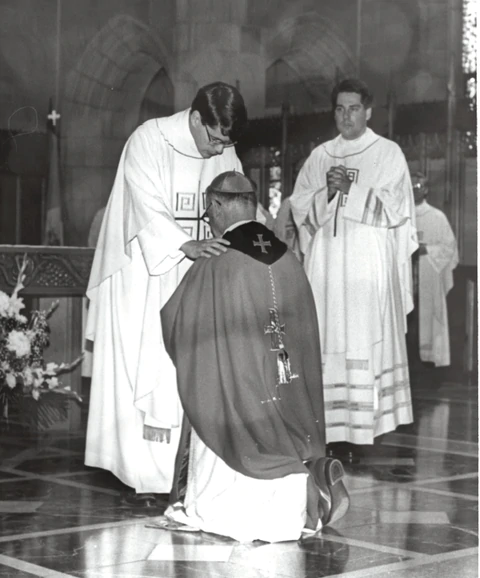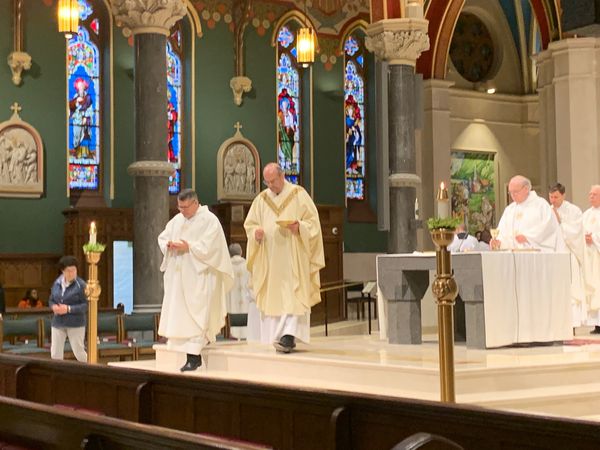Q&a: Syracuseís New Bishop Opens up about Clergy Abuse, Favorite Getaways, Doubts
By Julie McMahon
What other careers did you consider before entering the seminary? When I was a kid I always really wanted to be a police officer. I really thought about being a lawyer. I was really interested in being a JAG (U.S. Military Judge Advocate General). When it came to either studying for the priesthood or going to law school, thatís what the tug-of-war for me was all about. So a few years after I was ordained, when I walked in one evening to talk with Bishop Paul Loverde, our bishop at the time, he asked if I would go back to school. He talked about whether I would teach theology, but said, I wonder if you would go to get your canon law degree. I start laughing because before I ever became a priest I really wanted to become a lawyer. What is a canon lawyer, in lay manís terms? Basically itís the church version of a civil lawyer. Itís really just like civil law, there is church law. The canon lawyer deals with the churchís legal code just like a civil lawyer deals with the code of the country theyíre in.
So for my next question, I have some good news and some bad. The good news is that lots of people have been asking me if youíre the youngest Syracuse bishop; the bad news is youíre not. I wondered too. Iím not? Youíre actually the fifth youngest bishop [of 11]. Syracuse has had a wide range. Do you think your age Ė or your youthfulness, at least Ė is an attribute or a challenge? I consider it an attribute. I think in a lot of ways itís good for the young people, but even good for adults to see a person my age really interested in religion, interested in serving people. I think itís great to witness in that sense. I think itís an asset that I like sports, still like to play sports. I think itís good for young people to see heís not always in church, on his knees. Young people, well, everyone today lives in a busy, chaotic world Ė but we all seek connection and purpose. What role does the Catholic church play in that in this day-and-age? I think the answer is a sense of family. I think a lot of people today are looking for family ties, for connection. I think thatís something the church can help with. The church can help people to see they donít walk this way alone. I think in todayís society, loneliness is one of the great challenges for many people. They feel theyíre all alone, that no one is there for them. With phones, everythingís automated. Weíve heard the comment, could I get a real person, a real voice. Thatís what I see the church as, that real voice, that real person, where people donít feel that theyíre a number but that theyíre somebody. The Catholic church is often described as going through a challenging time right now, from churches closing to the clergy abuse scandal. Do you agree with that characterization, and whatís your role as bishop during this period? Thereís no doubt, I do see this as a difficult time Ė especially the clergy abuse scandal has tarnished the churchís reputation and caused great scandal and harm to the faithful. People have, as I said yesterday, I think first of the victims. Their lives have been destroyed. My first concern is them. From that also comes collateral damage, those who put their trust in the church. To see that trust taken away because of the way people have been treated and abused. I think the best way I can describe it is, in my own parishes, we discussed how life is holy ground. The simple reason why we took that theme is how do we respect ourselves and respect and care for others. You shared a personal connection to clergy abuse, of having a former pastor of yours dismissed because of a charge. Was that a priest you knew growing up? Can you share what that experience was like for you? He had been the parish priest for 10 years. I was still a lay person when that happened. I have to admit it made me wonder whether I wanted to be a priest. I really struggled, Iíve got to be honest with you. Yet what I realized is: How can I make a difference? How can I help change things? One of the ways I really wanted to change things is for people to always know they are valued and respected. As a bishop, what do you want to do for victims and to help victims? Is the financial compensation enough? First of all, I just want anyone who is a victim to feel that they can come to me, talk to me, and Iím not going to disregard what they say to me. I really want to hear them. In hearing them, I know itís not anything magical, but if there is any way that I can help them in their healing process, thatís what I want to do. Financial help is part of it, and I recognize that, but I also know sometimes itís just someone who is willing to, shall I say, take a person at their word and not just sweep everything under the carpet. Itís become more common among dioceses for bishops to release the lists of priests with allegations against them, as happened in both Syracuse and Ogdensburg. Do you have an opinion on releasing the names? I personally think that people have a right to know. Thereís a reason why we have the sex offender registry. I totally understand that people want to protect their children, and we canít cover that up. Who do you look to as role models, in both matters of the church and in life? First of all, Pope Francis. One of my great heroes is Nelson Mandela, someone who was imprisoned and came out seeking reconciliation. Do you have a favorite scripture? Psalm 23, ďThe Lord is my shepherd.Ē That particular passage. You mentioned you love sports and the outdoors, and that youíd be bringing your kayak to Syracuse. Whereís your favorite place to kayak? Lower Saranac Lake up in the Adirondacks. I love kayaking the lakes up there. Do you have a favorite hike? The Adirondack high peaks. I also like to hike Acadia over in Maine. How did you become a Boston Red Sox fan, living in New York? I grew up so close to New England, and in some ways felt like a New Englander living right there in the Champlain Valley. I always followed Boston. Is there anything more you want the people of the Syracuse diocese to know about you, any message you have for them? I want to let them know how excited I am to come there, to be with them, and serve them. I really feel privileged that Iíve been asked to come and walk the journey with them. Public Affairs Reporter Julie McMahon covers courts, government, education and other issues affecting taxpayers. She can be reached anytime: Email | Twitter | 315-412-1992
|
.
Any original material on these pages is copyright © BishopAccountability.org 2004. Reproduce freely with attribution.

